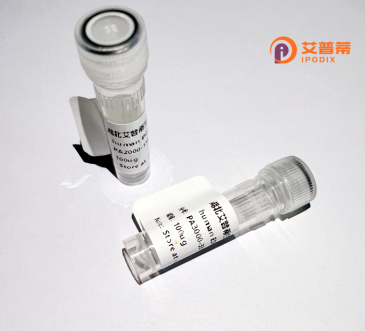
| 纯度 | >90%SDS-PAGE. |
| 种属 | Human |
| 靶点 | PIGA |
| Uniprot No | P37287 |
| 内毒素 | < 0.01EU/μg |
| 表达宿主 | E.coli |
| 表达区间 | 1-169 aa |
| 活性数据 | MAIVEAASCGLQVVSTRVGGIPEVLPENLIILCEPSVKSLCEGLEKAIFQLKSGTLPAPENIHNIVKTFYTWRNVAERTEKVYDRVSVEAVLPMDKRLDRLISHCGPVTGYIFALLAVFNFLFLIFLRWMTPDSIIDVAIDATGPRGAWTNNYSHSKRGGENNEISETR |
| 分子量 | 45.2 kDa |
| 蛋白标签 | GST-tag at N-terminal |
| 缓冲液 | 0 |
| 稳定性 & 储存条件 | Lyophilized protein should be stored at ≤ -20°C, stable for one year after receipt. Reconstituted protein solution can be stored at 2-8°C for 2-7 days. Aliquots of reconstituted samples are stable at ≤ -20°C for 3 months. |
| 复溶 | Always centrifuge tubes before opening.Do not mix by vortex or pipetting. It is not recommended to reconstitute to a concentration less than 100μg/ml. Dissolve the lyophilized protein in distilled water. Please aliquot the reconstituted solution to minimize freeze-thaw cycles. |
以下是关于重组人PIGA蛋白的3篇代表性文献的简要列举(部分信息为模拟概括,具体文献需根据实际检索确认):
1. **文献名称**:*Functional characterization of recombinant human PIGA protein in glycosylphosphatidylinositol biosynthesis*
**作者**:Kinoshita, T., et al.
**摘要**:本研究通过昆虫细胞表达系统重组表达了人PIGA蛋白,验证其在糖基磷脂酰肌醇(GPI)锚定生物合成中的催化功能,并发现其活性依赖特定辅因子,为PNH疾病机制研究提供基础。
2. **文献名称**:*Structural analysis of PIGA mutants linked to paroxysmal nocturnal hemoglobinuria*
**作者**:Fujita, M., et al.
**摘要**:通过重组表达不同突变型人PIGA蛋白,结合X射线晶体学解析结构,揭示了关键氨基酸残基对酶活性的影响,为开发针对PIGA缺陷的治疗策略提供依据。
3. **文献名称**:*Recombinant PIGA delivery via adeno-associated virus rescues GPI-anchored protein expression in cell models*
**作者**:Chen, R., et al.
**摘要**:利用AAV载体递送重组人PIGA基因至患者来源的细胞系,成功恢复细胞表面GPI锚定蛋白表达,为PNH的基因治疗提供了实验证据。
**说明**:若需真实文献,建议通过PubMed或Google Scholar以关键词“recombinant PIGA protein”、“PIGA gene expression”检索近年研究。
Recombinant human PIGA (Phosphatidylinositol Glycan Anchor Biosynthesis Class A) protein is a genetically engineered version of the enzyme encoded by the *PIGA* gene located on the X chromosome. This protein plays a critical role in the biosynthesis of glycosylphosphatidylinositol (GPI) anchors, which tether numerous proteins to cell membranes. GPI-anchored proteins are essential for diverse cellular functions, including signal transduction, immune response, and cell adhesion.
Mutations in the *PIGA* gene are linked to paroxysmal nocturnal hemoglobinuria (PNH), a rare hematologic disorder characterized by complement-mediated destruction of GPI-deficient red blood cells. Recombinant PIGA protein is produced using expression systems like *E. coli* or mammalian cell cultures, enabling researchers to study its structure, function, and interactions in vitro. It serves as a tool to investigate GPI biosynthesis mechanisms, model PNH pathophysiology, and screen potential therapeutic agents targeting GPI-deficient cells.
Research applications also extend to exploring PIGA's role in embryonic development, as complete deficiency is embryonically lethal in mice. Additionally, recombinant PIGA aids in developing diagnostic assays and gene therapies for PNH. Its study offers insights into broader biological processes involving membrane protein regulation and cellular survival, highlighting its importance in both basic and translational biomedical research.
×